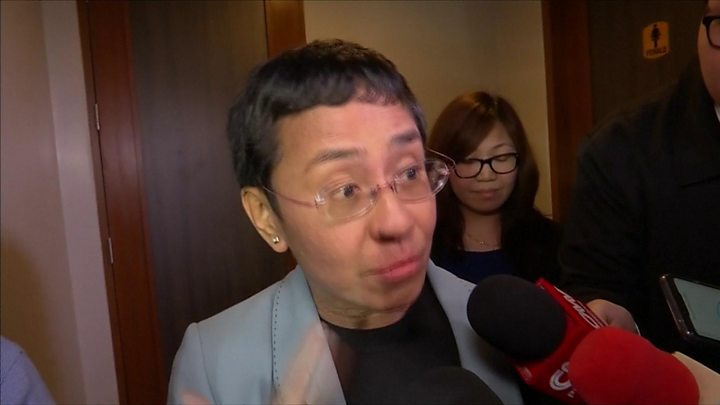
Award-winning Philippine journalist Maria Ressa has been freed on bail, the day after her arrest on charges of "cyber-libel" drew international condemnation.
Ms Ressa is CEO of Rappler, a news website critical of the government.
Press freedom advocates see this as a government attempt to silence the news organisation.
Ms Ressa has been accused of "cyber-libel," over a seven-year-old report on a businessman's alleged ties to a former judge.
The charges - the latest in a string against her - carry a potential 12 years in prison.
President Rodrigo Duterte has previously denied that charges against Ms Ressa are politically motivated, but has publically branded Rappler a "fake news outlet" and banned staff from covering his events. Last year, the state revoked the site's licence.
Ms Ressa is a veteran Philippine journalist who spent most of her career with CNN before co-founding Rappler in 2012. She was bureau chief for the US broadcaster in Manila, then in Jakarta. She was also its lead investigative reporter on terrorism in South East Asia.
Ms Ressa has won many international awards for her reporting, and was named a Time Magazine Person of the Year in 2018 for her work holding power to account in an increasingly hostile environment.
Francis Lim, a lawyer for Rappler, said the libel case was originally dismissed for lacking merit, but had now been resurrected.
"It means that the law can be twisted by the powers as a weapon against journalists who expose their wrongdoing to the public," he told Reuters.
A spokesman for President Duterte insisted the government has nothing to do with the libel case, and does not pursue critical journalists.
"That's absolutely unrelated. The president has been criticised and he does not bother," Salvador Panelo told DZMM radio.
BBC Philippines Correspondent Howard Johnson reports that journalists there are subjected to threats by supporters of the president, however.
Some argue that the press is biased against Mr Duterte, and that reports focus on his bloody drug war at the expense of his achievements while in office.